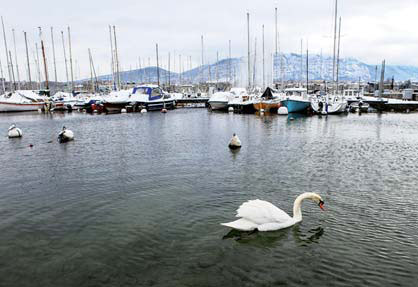Building up the image
Updated: 2013-01-25 09:30
By Diao Ying (China Daily)
|
|||||||||||
|
Switzerland sees more importance in interacting with other countries. Photos by Xie Songxin / China Daily |
|
A view of Lake Geneva. |
Presence Switzerland looks to leave lasting impressions in overseas markets
The efforts of the Swiss people to forge strong relations with the outside world have deep-rooted links in culture and history, says Verena Weber, deputy head of Presence Switzerland, the agency responsible for promoting the image of Switzerland in overseas markets.
Four languages are spoken in the country, and dealing with different cultures and languages is a natural part of daily life for the Swiss people, she says. "Spend half an hour on the train, and one can already listen to a different language."
She says the Swiss mindset is also related to the landscape of the country. "Surrounded by mountains and lakes, you always see the limits of yourself and places that you can live in." Therefore, unlike the larger countries that are self-sufficient and act on their own, Switzerland sees more importance in engaging and interacting with others.
There are also historical roots. It never had a king, and the typical European aristocracy does not have a tradition in Switzerland. Self-responsibility and liberal attachment therefore have become part of the Swiss tradition.
It also has a lot to do with economy and politics. Switzerland is a small country, and many sectors of its economy depend on exports. Politically, it is also largely on its own: it is not a member of the European Union, and it is not among the G20 members. This means that independence is as important as engaging with others for Switzerland.
Presence Switzerland is an example of such efforts being made. The agency was started in 2001, when there was international discussion about Jewish money deposited in Swiss banks during the World War II. People started to question where the money was and who it belonged to.
Before that, Switzerland mostly had a positive image, Weber says. It is known for good companies, good banks, as well as nice cheese and chocolate, she says. However, the economic crisis has reminded the Swiss people that this positive image might change, and something needs to be done about it.
Therefore the government has taken the initiative to build a good brand for the country on every possible platform. It set up Presence Switzerland to manage the image of the country abroad. The agency was integrated into the Federal Department of Foreign Affairs in 2009.
The organization protects the interests of Switzerland by using various public relations tools, according to Nicolas Bideau, head of the organization. He says its task is to transmit knowledge about Switzerland, forge understanding of the country, and portray its diversity and attractiveness.
To achieve this goal, it has monitoring and analytical tools to identify topics with high priority and also to detect any potential image crisis at an early stage, according to Bideau. During the times of economic and financial crisis, media coverage of the country could involve some negative aspects, he says.
When people talk about Switzerland, instead of the success of its expertise in the finance sector, they may talk about issues such as financial crime and banking secrecy, and those are having a negative impact on the image of the country.
"It is a core aspect of the communication agency to promote a positive perception of Switzerland abroad," he says. Despite all the negative banking stories, the country is trying to communicate to the public that it is in fact a stable, innovative and competitive financial center.
The agency also tries to emphasize some of the country's strengths that might be neglected otherwise. Switzerland is famous for its natural beauty and its traditional products such as cheese and watches, but its competitiveness in areas such as education, research and innovation is given little attention, Bideau says. Therefore, in its international communication it highlights these areas, and promotes an efficient Swiss education system.
It also has information and communication strategies for presenting specialized content on the right topic and to the right audience, using various platforms. For example, it makes use of large international events such as World Expos and the Olympic Games to reach the broader public. It also holds activities within the country, inviting foreign delegations for skiing trips and participating in programs such as apprenticeship projects to get a better understanding of how its industry works.
There are also other ways of endorsement. Sports, particularly winter sports, and renowned athletes such as Roger Federer and cyclist Fabian Cancellara help to promote its healthy image. Last year the agency used important events like the anniversary of Jean-Jacques Rousseau to hold special events for enhancing its image.
diaoying@chinadaily.com.cn
(China Daily 01/25/2013 page5)
Today's Top News
Police continue manhunt for 2nd bombing suspect
H7N9 flu transmission studied
8% growth predicted for Q2
Nuke reactor gets foreign contract
First couple on Time's list of most influential
'Green' awareness levels drop in Beijing
Palace Museum spruces up
Trading channels 'need to broaden'
Hot Topics
Lunar probe , China growth forecasts, Emission rules get tougher, China seen through 'colored lens', International board,
Editor's Picks

|

|

|

|

|

|







